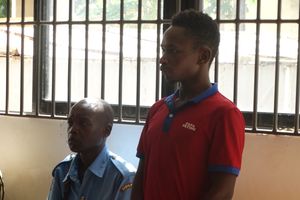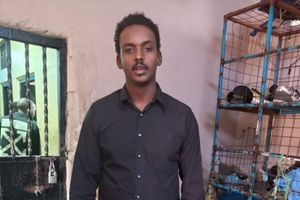‘I stopped attending class’

Cases of sexual and gender-based violence have made headlines in the recent past. Most victims are women according to studies and media reports.
What you need to know:
- More than 40 per cent of students in Kenya’s public universities experienced some form of violence; more than 68 per cent of this were female.
- Cases of university lecturers asking for sexual favours in exchange for grades are real.
- SGBV is not unique to Kenyan universities; it’s a global crisis.
Cases of sexual and gender-based violence (SGBV) have made headlines in the recent past with the brutal murders of key national figures including sports personality, Agnes Tirop, eliciting public outrage.
However, female university students have largely been left out of this conversation.
A 2020 study conducted by Akili Dada on the prevalence of SGBV in three of Kenya’s public universities, revealed that more than 40 per cent of students had experienced some form of violence; out of these, more than 68 per cent were female.
This particularly vulnerable demographic has continued to face violence globally. Sociologist Gidraph Wairire asserts that GBV in higher institutions of learning is not a new phenomenon.
“It has always been there but it was not clearly defined. Moreover, there has been a social change, which has helped people understand the concept of oppression and its drivers, one of them being GBV,” Prof Wairire says.
His sentiments are echoed by Dr Julia Kagunda, psychologist and founder of Elim Trust, who agrees that GBV is an issue of concern in private and public institutions of higher learning.
“Aside from physical violence, emotional and financial violence are predominant in universities. Some female students ‘play wife’ to their colleagues who control their phones and restrict their movement, affecting their education,” she says.

Even though intimate partner violence is the most common form of SGBV in universities, there has been a spike of school-related GBV where university staff abuse their positions of power to solicit sexual favours from students in exchange for good grades.
University of Nairobi Students’ Association chairperson Melvin Thogo, tells nation.africa that cases of university lecturers asking for sexual favours in exchange for grades are real.
Her assertions are corroborated by research conducted by CampusMeToo movement, a Pan-African organisation advocating against sexual harassment of students in higher learning institutions.
CampusMeToo collected anonymous testimonies from survivors of ‘sex for grades’ in more than 70 institutions. Below are some of the survivors’ responses.

Chuka University student

Pwani University

Technical University of Kenya

University of Nairobi

Multimedia University
Interventions in SGBV war
School-related GBV is also prevalent in other parts of the world. Last February, three Harvard University Graduate School students filed a lawsuit claiming the university failed to protect them from sexual abuse. The plaintiffs alleged that a male professor, “kissed, groped and made unwelcome sexual advances towards them while threatening career sabotage if they complained.’’
Again in a social media campaign akin to the MeToo Movement, female students in Morocco, last January, revealed how prevalent the vice is in their universities. A 24-year-old student said she was expelled from Hassan 1 University under the pretext that she had cheated in an exam. She, however, maintained that she had refused to submit to sexual blackmail from one of her professors.
In an interview with AFP, lawyer Aicha Guella said nearly 70 complaints had been filed against Morocco’s Esaadi University of Tetouan, with no response from the administration. Although SGBV cases in universities are on the rise, research and advocacy efforts often focus on survivors, with no clear picture of the attitudes towards the vice amongst university students.
Dr Kagunda believes that high stress levels coupled with high alcohol consumption and substance abuse, exacerbate GBV in universities. Lack of guidance and counselling for ‘freshers’ has also been fronted as a cause of SGBV.
Mary Ojwang’, the national programme lead of Women Students Mentorship Association (Woswa), a female students’ association based at the University of Nairobi, reiterates that it is common to see First Year female students spend their pocket money on their boyfriends who are mostly, older.
“Many are blind to the financial exploitation, and it is only after our interactions that they realise they were being used,” she says.
To limit the vice many Kenyan universities have developed codes of conduct to govern how students relate with each other, and the offences that would amount to GBV.
In Moi University, University of Eldoret, Kenyatta University, and Kenya Medical Training College, for example, romantic relationships between students and staff is prohibited.
“The university discourages romantic and sexual relationships between staff and student, or between supervisor and employee even when such relationships appear, or are believed to be, consensual except where the relationship is between legally married persons. The lines of power and authority that exist between the parties may undermine freedom of choice,” reads the Moi University Sexual Harassment and Discrimination Policy.
The University of Eldoret allows for creation of alternative academic or supervisory arrangements to prevent romantic relationships between staff and students. In circumstances where this is not feasible, the relationship cannot continue.
Moi University provides for the anonymity of the complainant and terms comments that might dissuade victims from pursuing their rights a violation. However, to avoid and minimise malicious allegations, the institution does not provide anonymous complaints on perpetrators and the accused must promptly be made aware of the complaint and of the identity of the complainant(s). A person who believes she/he is being harassed or otherwise subjected to discrimination, is encouraged to consult the Office of the Sexual Discrimination and Harassment Officer, or his/her representative on campus.
“Each individual must not expose himself/herself to sexual discrimination, harassment and/or offences by way of talking, dressing, acting or sharing of pornographic material, “states the Policy.
Kenyatta University treats all persons involved in cases of SGBV with confidentiality and will disclose the information only as required by law, and as necessary to meet its legal obligation to investigate and take action to end the vices. Under the institution’s Policy on Sexual and Gender-Based Violence 2013, individuals who think they are SGBV victims should report promptly, ensure accurate communication of the allegations and fill the designated university forms, regardless of the status of the perpetrator or the nature of the incident.
At KMTC, a victim can make either a formal or informal complaint if sexually harassed. “An informal complaint is made to any academic member of staff, college administrator or person in charge of handling sexual harassment issues. It is made in cases where the offended wishes for something to be done (warn the harasser or transfer him/her to another department or change his/her dissertation supervisor) but is not ready to lodge a formal complaint,” it reads.
It adds that the department will investigate the complaint exhaustively and make adequate disciplinary decisions, which include termination of services, suspension or expulsion of the student and barring such persons from accessing the institution.
Despite comprehensive SGBV policies, many such cases in universities remain unreported. Where a survivor files a complaint, they face stigma and intimidation from perpetrators, and end up withdrawing the complaints.
Dennis Odero, President of the Students’ Association at University of Egerton, says that in most SGBV cases, the complainant withdraws the case after being coerced by the perpetrator.

Jael Diana, the face of CampusMeToo movement, and who was harassed as a First Year student.
Jael Diana, the face of CampusMeToo movement, and who was harassed as a first-year student, says collection of evidence is a big challenge.
“Most first-time victims never anticipate that they would be harassed, so they aren’t usually prepared with devices to record as would be the case in a setup. When they finally come out with only their side of the story, it’s usually their word against that of the accused lecturer, and they even risk getting sued,” she says.
She adds that cyber bullying and victim blaming, which she experienced first-hand, also contribute to the silence among students. Some people, she says, accused her of putting herself in a compromising situation, while others said she encouraged it.
“At first, I did not want to share my experience but when I realised that many others were going through the same, I decided to become an ambassador. The more we keep quiet, the more the harassment will be swept under the rug. Students must understand that the power to change things lies with them and it begins with speaking up,” she narrates.
Zinhle Geluk, a student resident leader at University of Cape Town, South Africa tells nation.africa that although her university has a policy on sexual misconduct, goodwill from the administration is instrumental in realising justice for survivors.
“There also needs to be constant education on concepts such as consent, because most young students are unfamiliar with them,’’ she says.
Melvin Thogo, University of Nairobi Students’ Association chairperson recommends the suspension of university staff and leaders implicated in SGBV cases.
“Most survivors are unwilling to report when the perpetrators are still in positions of power. Accused persons should, therefore, be suspended until investigations are concluded,” she says.
Some survivors resort to approaching the courts for a remedy, but that route is cumbersome. A study Delayed & Denied: Legal and Administrative Bottlenecks to effective and efficient delivery of Justice for Survivors of SGBV conducted by Coalition on Violence against Women (Covaw) found that more than 50 per cent of SGBV cases take more than four years to be concluded.
The case of Ivy Wangechi, a medicine student at Moi University, who was brutally killed in 2019, is yet to be determined. It has been postponed severally because of defence lawyer withdrawal from the case. In an earlier interview with Daily Nation, Winfred King’ori, the late Wagechi’s mother, expressed frustration over constant adjournment of the case.
“We spend between Sh60,000 and Sh100,000 for every trip to bring these witnesses. Emotionally and financially, nobody seems to care about what we - the victim’s family - is going through,” Ms King’ori said.
CampusMeToo
Campusmetoo, which was launched in 2019, is a Pan-African movement against sexual harassment by staff towards students in higher learning institutions. The movement was inspired by the success of the #MeToo and #SexForGrades.
The students came up with demands including the coverage of sexual harassment topic in every induction for newly enrolled students, annual sexual harassment training for all staff after which they would sign a standardised code of conduct and ethics, and the appointment of a gender officer to support victims and develop sexual harassment policies, among other roles.

Grace Gitau (front row, second left) , the project coordinator of Campusmetoo campaign, with student ambassadors of the movement at the University of Nairobi on May 24, 2022.
The students also wanted the establishment of an investigative committee on missing marks and the incorporation of the demands into the varsity’s sexual harassment policy.
“We initially handed the demands over to Charles Obiero, Deputy Director, Directorate of Higher Education, and Ministry of Education on December 9, 2019 via a petition that was developed and backed up by more than by 11,000 signatures from students across the country,” recalls Grace Gitau, a coordinator for the movement.
On February 3 last year, Kenya’s Ministry of Education directed vice chancellors of public and private universities to implement the five student-led demands.
Since then, only 17 higher learning institutions have embraced the CampusMeToo movement. They are the University of Nairobi, Kenyatta University, the Technical University of Kenya and Moi University, the Kenya College of Accountancy, the Great Lakes University of Kisumu, Maseno University, Zetech University and Cooperative University.
The students are supported by ActionAid Kenya, UN Women Kenya, the Ministry of Education, Ministry of Gender, the Commission for University Education Kenya and other key stakeholders.
“The movement has increased awareness on sexual harassment on campus. Part of the students’ multi-pronged advocacy has been development and dissemination a tool-kit, which enables them to prevent, collect evidence, report and be an active bystander," she says.
RADA mobile application
RADA is a student-developed mobile health application, which enables access to information about sexual and reproductive health, drug abuse, professional counselling and peer counselling services, and a helpline for emergency situations when they are on campus.
“The content on the application has been validated by the National Authority for the Campaign against Alcohol and Drug Abuse (Nacada), the National Aids and STI’s Control Programme (Nascop), JHPIEGO, Ministry of Health,” explains project coordinator Lisbeth Kageni.
The app, first launched at the University of Nairobi in partnership with United Nations Educational, Scientific and Cultural Organisation (Unesco) and Sexual and Reproductive Health (SRHR) Alliance, has been adopted in Mount Kenya University and is being piloted at Moi University, Masinde Muliro University and Egerton University, among other institutions.
It can only be used by students enrolled in the university. It allows them to anonymously report SGBV cases and access psychosocial and legal services for free.
However, Ms Kageni who is its coordinator says that despite the progress, University of Nairobi students’ uptake of the application is still low.
Vunja Kalabash
Vunja Kalabash Initiative is run by Elim Trust and targets opinion leaders, including student leaders and administrators, who seek to change negative social norms like SGBV and drug abuse, among others.
“We focus on student leaders because our research found that they are sometimes the perpetrators owing to the influence they wield; by educating them, we expand our reach significantly through them,” says Ms Gachoki, the project coordinator.
The student leaders then engage in anti-SGBV campaigns in universities. First and Second Year students are, especially targeted because of their vulnerability. Vunja Kalabash has penetrated 15 public and private universities. “We use different techniques to raise awareness and destigmatise GBV, including art exhibitions, spoken word, photography, videography and music. But most notably, conversations in the dark where survivors get a safe space to speak out and get counselling,” explains Ms Gachoki.
SGBV a global crisis
Last April, Debanhi Escobar, 18, a law student, was found dead in an underground water tank Nuevo Leone, a border state in Mexico. Forensic reports revealed that she was raped and died of a blow to her head. Ms Escobar’s case made headlines after surveillance camera footage showed a taxi driver who was supposed to take her home inappropriately touching her. Ms Escobar alighted from the taxi because of the harassment and was later found dead in a water tank.
In August last year, Nosicelo Mtebeni, 23, a law student at the University of Fort Hare in South Africa, was killed and dismembered by her university boyfriend, Alutha Pasile. Ms Mtebeni’s body was cut into parts and stuffed in a suitcase. Her body was found on the streets of East London’s Quigney suburb.






